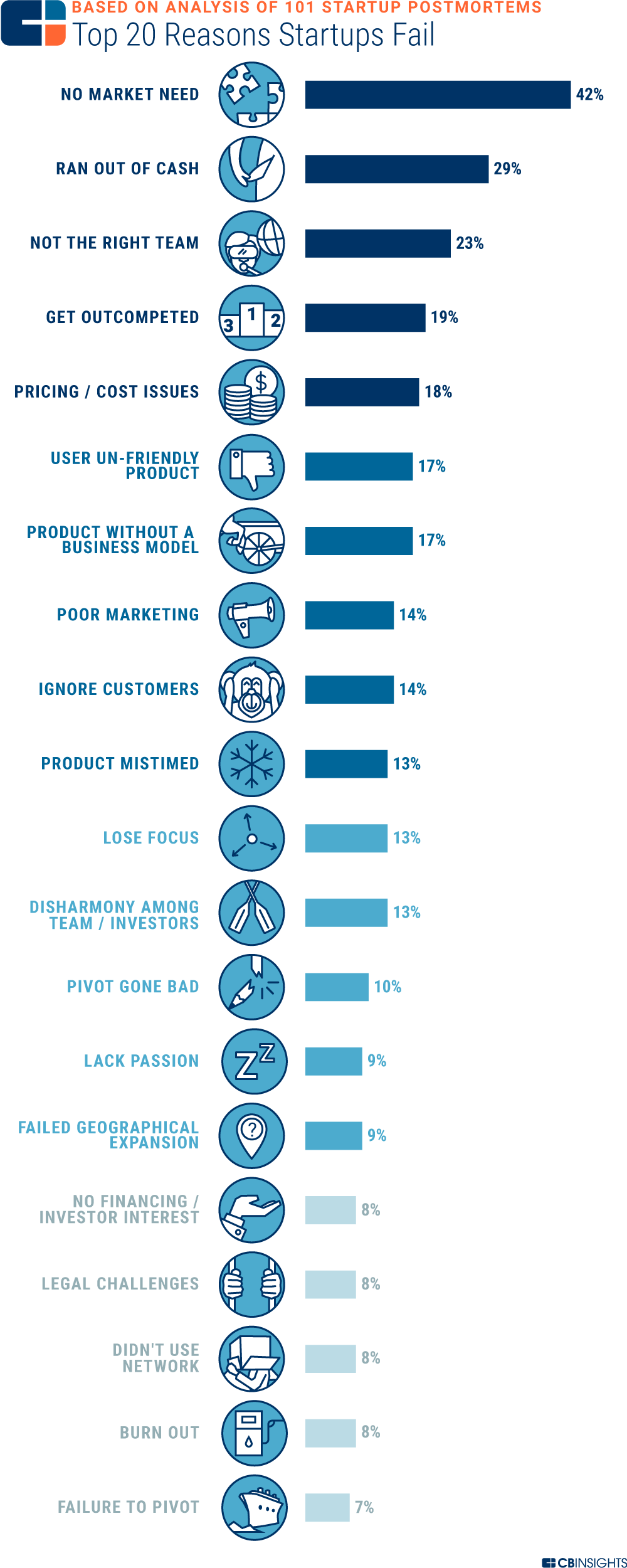Best Collaboration Tools for Teams 2023
Find the best collaboration tools for teams to help improve productivity and workflow within your company.
Find out 8 reasons why collaboration among employees and teams will save your business from failure.
Startup failure. It cannot be eradicated. It is part of the startup ecosystem. Getting out-competed, no market need, team disharmony and running out of cash are just some of the common startup failure reasons within a long list.
In this blog post you will learn 8 reasons why you should improve collaboration amongs your employees to avoid the potential failure of your company.
When you begin to look closer at the common startup failure reasons, a few things become clear:
So let’s take a look at the most common reasons why startups fail. This chart is courtesy of CB Insights.

(Image Source)
To add a little more context, here some more interesting insights and statistics:
According to Glassdoor's 2019 Mission and Culture Survey, before applying for a job, nearly four in five employees and job seekers consider a company's mission and culture. This is only becoming more important as younger people move into the workforce. 65% of 18-to-34-year-olds are likely to place culture above salary; that's higher than any other age demographic surveyed. (Source: Glassdoor)
When we combine these statistics, patterns begin to form about how employee collaboration strategies and better collaboration among employees can reduce startup failure risk. When collaboration permeates the entire organisation, and forms an integral part of the company's culture there are huge benefits to your bottom line, we have defined 8 ways collaboration can help reduce startup failure risk.
Simply put, collaboration drives Innovation!
Sometimes, you just hit a wall and aren’t sure where to go or what to do next, and that is common within a startup. I have met thousands of startup founders, and the one thing the majority have in common is the fact they have an amazing innovation mindset, but they don't know how to overcome every challenge and problem. Whatever stage your startup is in, collaboration amplifies innovation. Whether employees, peers, your network or your customers - their combined power of collaboration can help mitigate many of the common startup failure risks.
According to PwC, effective collaboration is the key ingredient to making innovation happen.
“The collaborative approach is remarkably effective at building consensus, increasing levels of motivation and participation, pulling teams together, and coaching more junior members,” PwC wrote. “It provides fertile ground for experimentation, resulting in more innovative results.”
Effective collaboration is essential to the modern workplace. As organisations are spread across different locations, different time zones, and even different languages, successful communication becomes even more important for keeping projects on track and initiatives aligned.
However, traditional meetings take up a lot of time especially in fast-moving startups. Sometimes that time is necessary, but in other cases it could and should be minimised.
 A 2019 report from Doodle studied 19 million meetings and interviews with more than 6,500 professionals in the U.S., U.K., and Germany.
A 2019 report from Doodle studied 19 million meetings and interviews with more than 6,500 professionals in the U.S., U.K., and Germany.
They found that the cost of poorly organised meetings in 2019 would reach $399 billion in the U.S. and $58 billion in the U.K. Additionally, 44% of those surveyed said that poorly organised meetings are a significant cause that employees are not left with enough time to complete their work.
Company collaboration tools can help cut down on meetings and boost productivity, so can ‘Collaboration Analytics’ by understanding the trends of how your teams communicate and collaborate, and how these can be improved.
There are many startup books probably already on your reading list, to understand more about the power of collaboration, improved employee productivity and breaking down collaboration barriers; I recommend reading Creativity, Inc - Overcoming the Unseen Forces That Stand in the Way of True Inspiration.
Encourage complex collaborative teams to collaborate more. If team members in product development collaborate, but the marketing team is minimally or not at all involved in the development, marketing team members will have a lot of catching up to do before they’re ready to present a marketing strategy for a new product. This then has knock on effects to other teams and this will slow down your time to market.
The duration of your time to market can have a severe negative impact on your business. Organisations who embrace and foster improved collaboration among employees are 60% more likely to launch into a market faster with a more successful outcome.
The question now is how you can foster team collaboration and accelerate your time to market:
Collaborative work and its benefits extend to customers as well. In organisations where team collaboration is healthy, standard practices are in place for addressing and following up on customer cases. Issues with website-friendliness, customer service, and customer complaints are promptly directed to the individual or team who can resolve the problem and improve experiences for the next customer.
If you have ever heard the term ‘Customer-Centric’ then you will find the startups who achieve this are typically the startups who are ‘Collaboration-Centric’ first.
Tracking progress and measuring productivity is more readily accomplished in a collaborative workplace, and frequent irritating team briefings aren’t needed when everyone is in-the-know. Problems are identified sooner because teams are consistently touching base on multiple levels. The effect? Reduced duplicated work, less rework, and better fluidity when tweaks are needed.
Knowledge sharing—the exchange of information across your startup, teams, partners and customers—has never been technically easier thanks to collaboration tools, digital communication tools and the internet. Yet, the more information there is the less employees are generally inclined to share it with one another. That means business leaders champion collaboration and must strive to streamline, even incentivise the collaborative exchange of expertise.
Ultimately, knowledge sharing promotes the healthy, sustainable growth of modern businesses, regardless of industry. With knowledge sharing at the core of your startup you can mitigate the risk of many common startup failure reasons.
 Technology is great, it can add superpowers to team collaboration, but technology can also create information silos. Most collaboration tools allow us to create information in both private and public areas, anything created in a private channel or private area is counter productive to collaboration within startups.
Technology is great, it can add superpowers to team collaboration, but technology can also create information silos. Most collaboration tools allow us to create information in both private and public areas, anything created in a private channel or private area is counter productive to collaboration within startups.
Think about this scenario “Hmmm…I’m not 100% sure how I’m supposed to format this document, I think I have seen something similar previously, I can’t find it easily and I’m not sure whom to ask, so I’ll create my own document”.
This simple scenario happens every hour of every day. It costs time. It creates more silos. It can remove consistency from your messaging and branding. It has a negative impact on your bottom line.
To break down information silos in your startup, encourage cross-team collaboration, encourage everyone to make their information easy to find and set standards for how your startup should use Slack, Google Workspace, Microsoft Teams and other collaboration tools.
Team alignment is integral for seamless and effective business processes, your customer experience, your marketing effectiveness, your revenue growth, well actually every aspect of your startup.
It also helps encourage collaboration which creates happier, more effective teams. Without alignment, each department works independently with its own goals, data sets, and technology applications. These are the traits of a siloed organisation.
Without collaboration it becomes impossible to create team alignment, and without team alignment you will be slower, less efficient, less innovative and less customer focused which will ultimately increase your startup failure risks.
 The term “war for talent” was coined by McKinsey in the 90s and grew in popularity through the naughties when the book by the same name was published. The “war for talent” addresses increasingly fierce competition to attract and retain top talent at a time when too few workers are available to replace the baby boomers now departing the workforce.
The term “war for talent” was coined by McKinsey in the 90s and grew in popularity through the naughties when the book by the same name was published. The “war for talent” addresses increasingly fierce competition to attract and retain top talent at a time when too few workers are available to replace the baby boomers now departing the workforce.
Fast forward 20 years and a McKinsey Global Institute study suggests that employers in Europe and North America will require 18 million more college-educated workers per year in 2020 and beyond than are going to be available. It is estimated that companies may not be able to fill one in ten roles they need, much less fill them with top talent.
When you combine the premise of the “war for talent” with the highly competitive nature of today's startup ecosystem, it becomes clear that your strategies for attracting top talent are more important than ever before.
The term “employee value proposition,” or EVP: what employees get for what they give is nothing new. The “Gives” remain pretty static, employers expect—time, effort, experience and ideas. However the “Gets” are subtly changing. Tangible rewards, the way its leadership helps employees, and the substance of the work are all very common. But employees now rank team collaboration, digital communication, trust and social impact as important “Gets”.
In essence if your EVP is truly stronger than the competition’s, you will attract and retain the best talent and gain competitive advantage. If collaboration is fundamental to your EVP, then every new employee and every instance of cross-team collaboration will positively enhance your employee value proposition.
As we covered, the cross-team collaboration (also known as inter-team collaboration) is a key component to growing and scaling businesses successfully. Through integrations with Slack, Google Workspace, and all key productivity tools we can help your company understand more about collaboration patterns, and help you improving team productivity. Are you ready to learn more?
Find the best collaboration tools for teams to help improve productivity and workflow within your company.
Find out more about why startup collaboration culture is a critical success factor for fast growth startups like aioneers and building winning teams.
The future of work is here, effective team collaboration and communication are critical success factors for startups, mid-market and fast growth...